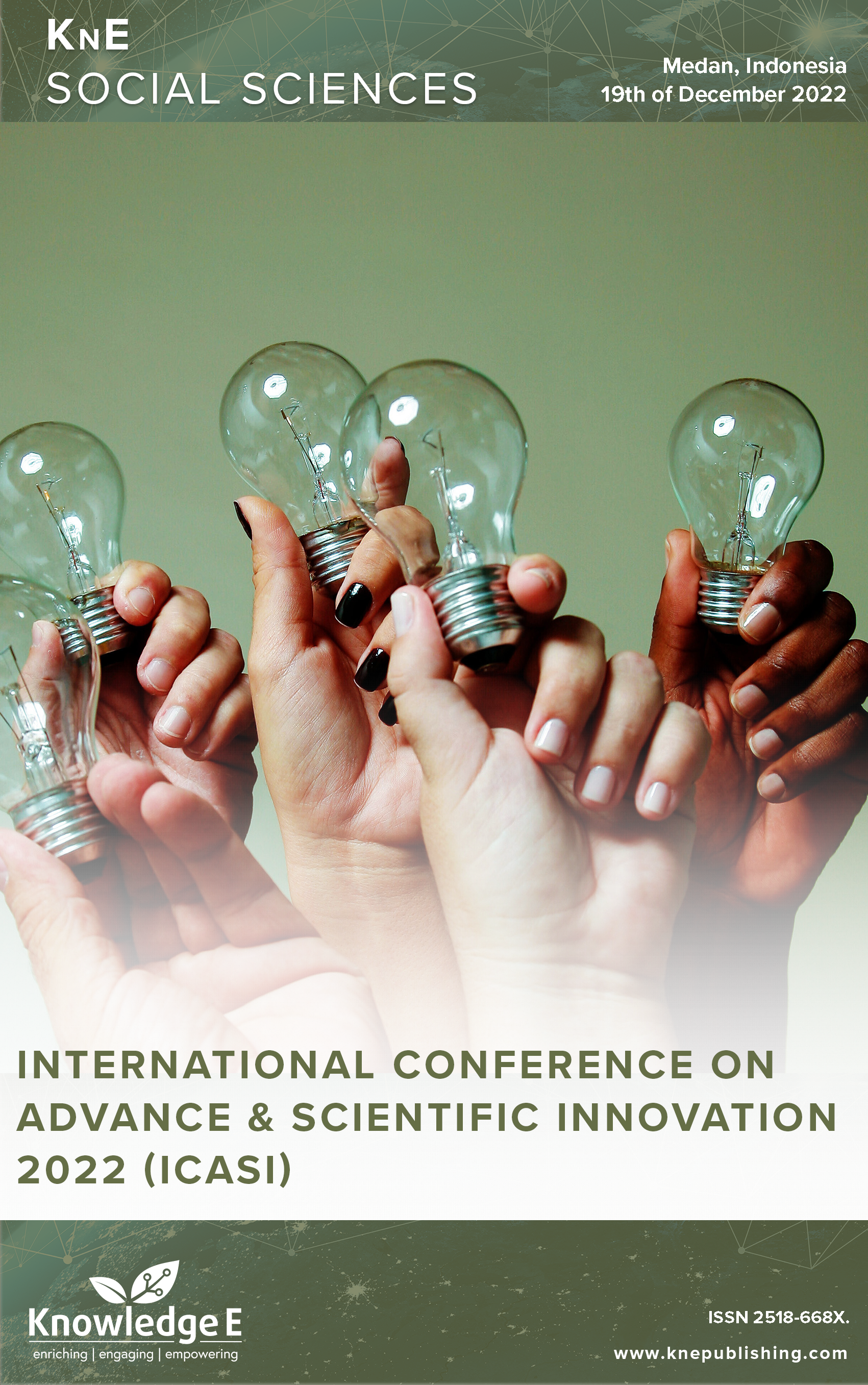The Effect of Self-Efficacy, Self-Leadership, and Work Ethic on Employee Performance in Manufacturing Companies
DOI:
https://doi.org/10.18502/kss.v8i9.13408Abstract
The purpose of this research was to analyze the role of self-leadership, self-efficacy, and work ethic on employee performance in manufacturing companies in Indonesia. This study used a quantitative approach with explanatory methods to determine the causality among variables. The population was manufacturing employees in Surabaya, Indonesia, with a sample of 260 employees who responded to the questionnaire distributed via Google Forms. Data analysis was done using multiple linear regression. T-test and F-test were used to test the hypothesis. The results showed that selfleadership, self-efficacy and work ethic play a role in the value of 0.680. In other words, the three aspects had a 68% influence on improving employee performance. While the hypothesis testing showed, the F-test had a significant effect of <0.05. The results implied a significant effect, but only self-efficacy has a significant effect on employee performance. In contrast, self-leadership and work ethic have no significant effect. This indicates that employees should be encouraged to have self-efficacy to improve their performance.
Keywords: Self-Efficacy, Self-Leadership, work ethic and employee performance
References
[2] Baron A, Manajemen Kinerja. Jakarta; 2013.
[3] Wibowo, Manajemen Kinerja, Edisi Keti. Jakarta: Rajawali Pers; 2010.
[4] Ahmad WK. Pengaruh Budaya Organisasi, Kepemimpinan Spiritual, Dan Efikasi Diri Terhadap Kinerja Karyawan Studi Kasus Pada LKC DD Ciputat. Jakarta Fak. Ekon. Dan Bisnis Univ. Islam Negeri Syarif Hidayatullah; 2016.
[5] Husain T, Muhammad, Mujanah, Siti dan Andjarwati. The Effect of Individual Characteristics, Resilient and Work Ability on Intention to Leave and Employee Performance at PT Clariant Adsorbent Indonesia, Gresik. J. Ekon. dan Bisnis Jagaditha. 2022;9(1).
[6] Imawati I. N., Syafruddin, A., & Musfiroh, “The Influence of Self-Efficacy on Employee Performance Through Job Satisfaction and Organizational Commitment as Intervening Variables.,”. Int. J. Bus. Manag. Invent. 2014;3(4):6–12.
[7] Fathul Himam VF. Efikasi Diri Untuk Meningkatkan Optimisme Terhadap Pencapaian Karir Karyawan Pkwt Perusahaan X Self Efficacy To Increase Career Optimism On Employee Contract (PKWT). J. Interv. Psikol. 2014;6
[8] Bandura A. Self Efficacy – The Exercise of Control. New York; 1997.
[9] Ghufron, Risnawita. Teori-Teori Psikologi. Yogyakarta; 2011.
[10] Mujanah S. The Effect of Self-Efficacy, Competence, and Emotional Quotient on Employee Performance Through Career Development as an Intervening Variable on Companies. 17th Int. Symp. Manag. (INSYMA 2020). Adv. Econ. Bus. Manag. Res. 2020;https://doi.org/10.2991/aebmr.k.200127.012.
[11] Cherian JJJ. Impact of self efficacy on motivation and performance of employee. Int. J. Bus. Manag. Invent. 2013;8.
[12] Goleman D. Emotional Intelligence. Kecerdasan Emosional Mengapa EI Lebih Penting daripada IQ. Jakata: PT Gramedia Pustaka Utama; 2009.
[13] Bandura A. Guide for constructing self-efficacy scales. In Self-efficacy beliefs of adolescents. Inf. Age Publ.; 2001. pp. 307–37.
[14] Fitri Purwanto SS, Siti Mujanah. The Effect of Self-Leadership, Self-Ability and Resilient on the Performance of Surabaya Satreskrim Police Investigators Through Organizational Commitments As Intervening Variables. 2022;7(1.4).
[15] Abellia PS, Mujanah. The Effect of Self Ability, Compensation, and Self Efficacy on Employee Performance At Rizqy Jaya Mulia Sidoarjo Company. Appl. Manag. Bus. 2021;2(1).
[16] Marnis M. Pengaruh self leadership terhadap kinerja karyawan PT Perkebunan Nusantara V Riau. J. Ekon. 2011;18(4).
[17] N. C. dan U. M. Dyah Sawitri, Hubungan Self Leadership, Self Efficacy dan Kecerdasan Intelektual Terhadap Kinerja Karyawan pada Badan Pendapatan Daerah Kabupaten Mojokerto. J. Manaj. Bisnis Indones. Nurmala Cahyandari. 2018;6(1).
[18] Alampay P. L. P., Godwin, J., Lansford, J. E., Bombi, A. S., Bornstein, M. H., Chang, L., & Oburu, “Severity and justness do not moderate the relation between corporal punishment and negative child outcomes: A multicultural and longitudinal study.,”. Int J Behav Dev. 1999.
[19] Rachmawati WRE, Mujanah S. Pengaruh Self Leadership, Kecerdasan Sosial, Employee Ability Terhadap Komitmen Organisasional Dan Kinerja Karyawan Dinas Pengendalian Penduduk, Pemberdayaan Perempuan Dan Perlindungan Anak Kota Surabaya. J. Ilmu Ekon. Manajemen. 2020;5.
[20] Ginting M. Kontribusi kepemimpinan dan motivasi kerja terhadap kinerja karyawan melalui budaya organisasi sebagai variabel mediasi pada PT. Bank Sumut Medan. J. Manaj. Bisnis dan Kewirausahaan. 2016;4(1):41-52.
[21] Sinamo JH. 8 Etos Kerja Profesional Navigator Anda Menuju Sukses. Jakarta: PT Spirit Mahardika; 2011.
[22] Putra SAP, Purwani LD, Nurhayati. The influence of transformational leadership and job satisfaction on employee performance with the mediation of organizational commitment in the context of SMEs. J Entrep Educ. 2020;23(2):1–9.
[23] Lawu RLSH, Suhaila A. Pengaruh Etos Kerja Terhadap Kinerja Karyawan Pada Pt Pos Indonesia Cabang Pemuda Jakarta Timur. J. Penelit. Ilmu Manaj.,2019;2(1)
[24] Noviawati A, DR, Amalia. The Relationship Between Self-Efficacy and Entrepreneurial Intention: A Study Among Indonesian University Students. J. Ilm. Mhs.2016;1(1):1-11.
[25] Hadiansyah RPA, Yanwar. Pengaruh Self-Efficacy terhadap Kinerja Karyawan pada PT. PLN (Persero) UP3 Cirebon. urnal Ilm. MEA (Manajemen, Ekon. Akuntansi). 2015;2(2):266–281.

